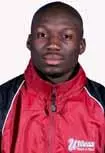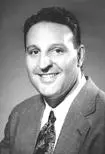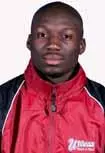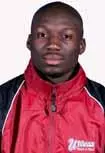University of Massachusets Athletics

Running Towards A-10 Recordbook
June 25, 2003 | Men's Outdoor Track
June 25, 2003
University of Massachusetts senior sprinter Kwesi Frimpong-Boateng has always aspired to be like his father.
Meeting the standards of Dr. Kwabana Frimpong-Boateng is no small task, though. Until several years ago, the elder Frimpong-Boateng was the only heart surgeon in Ghana, a country of 13 million citizens. There, in his homeland, he gained international fame by founding the National Cardiothoracic Center in Ghana's capital, Accra. With funds from his Heart Foundation, Dr. Frimpong-Boateng has built the center into a model for other African countries.
"If I could be like him - half of what he is - I'd be happy," the younger Frimpong-Boateng said.
While his father has set standards in Ghana, Frimpong-Boateng has set several of his own while attending UMass. Racing for the UMass track and field team at the 2003 Atlantic 10 Outdoor Track and Field Championships, May 3-4, he set school and meet records in both the 100- and 200-meter dashes, winning the 100 in 10.30 and the 200 in 20.90. He also holds the Minuteman record for the 55-meter dash, which he set en route to a gold medal at the 2002 Atlantic 10 Indoor Championship.
The victories at the Atlantic 10 Championship this year, which earned him the award of the meet's Most Outstanding Track Performer, were part of a remarkable stretch of six weeks for Frimpong-Boateng. Beginning at the Southern Connecticut Invitational, the second meet of the season, he won eight straight 100-meter races, including victories in the New England Championship and the IC4A Championship.
"It felt good," Frimpong-Boateng said of the win streak. "It's expected from me. It's not like, 'Are you got to win anymore?' It's, 'What time are you going to run? What records do you want to break this time?' I'm expected to win now. So it's basically routine."
Frimpong-Boateng rode this momentum into the NCAA East Regional meet, where, if he had finished in the top five, he would receive a bid to the NCAA Championships, June 11-14, in Sacramento, Calif. Looking at the best times of the other competitors, Frimpong-Boateng and UMass Coach Ken O'Brien believed he had a good chance to advance.
"I went down there just knowing according to some information we have on entries as to what the times of the other 100-meter people are," said O'Brien, who is in his 37th season at his alma mater. "And I believe that him making the top five and advancing to nationals is a very reasonable expectation for him."
Frimpong-Boateng did some scouting of his own.
"I go on the internet to see what my competition is," Frimpong-Boateng said. "If somebody has beaten me before, I'm out to get them."
But Frimpong-Boateng had been battling the flu for several weeks and it finally caught up with him. In the preliminary round, he finished in 10.55, qualifying for the finals with the sixth-best preliminary time. But in the finals, he faltered down the stretch, finishing seventh with a time of 10.56 and missing a trip to the national championship by .05 seconds.
"He was with the field for 70 meters and just couldn't put it away with a big finish because his strength was sapped," O'Brien said. "With the 100-(meter dash), you can't afford to be less than 100 percent."
"I wasn't myself," Frimpong-Boateng said. "I could've run much faster. I had a great season, so it wasn't that disappointing. But I was disappointed, too, because I had a great season and when it really counted, I messed up, but there was not much I could do about it."
Running through adversity is nothing new to Frimpong-Boateng, though. In the 2001 Atlantic 10 Outdoor Championship, he pulled a muscle while anchoring the UMass 4x100-meter relay team. He and his teammates had built up a big lead, though, so he was able to limp the last 20 meters to victory.
"I expect to win; I run to win," Frimpong-Boateng said. "As long as I've got my legs, I'll run."
The next day, Frimpong-Boateng ran in the finals of the 100-meter dash, for which he had qualified the day before, because every runner that participates in the finals gains points for his team. He sprinted half the race before the pain of his pulled muscle grew too great and he was forced to walk the final 50 meters.
"That tells you that he's a dedicated, serious, team-oriented and determined individual who wants to help out where he can," O'Brien said.
It didn't take long for O'Brien to notice this in Frimpong-Boateng. In one of Frimpong-Boateng's first workouts with UMass, O'Brien made the team run 200-yard sprints on the Boydon fields. The sun shined brightly, but two feet of snow covered the ground. Nonetheless, Frimpong-Boateng was resolute on making a good first impression.
"Here's a kid who, number one, was out of shape and, number two, obviously had never trained in snow before, I assume," said O'Brien. "And he was determined to lead all of those workouts."
Running in snow isn't the only unusual training technique O'Brien exposes his team to - the destruction of UMass' Derby track to make room for a power plant has left the team without a real training facility and has relegated it to the Curry Hicks Cage or the Amherst College track (weather permitting) five nights per week and the Smith College track for two nights per week during the winter.
"You're trying to construct a workout scenario that you know is the right thing to do if you had a complete facility," O'Brien said. "But it's awful tough to do that around a basketball court. But the other alternative is to not do anything and end up in pretty bad straights that way. So, we've had to improvise."
This improvisation has taken many forms - running stairs in Warren McGuirk Alumni Stadium or the Southwest dorms, plyometric training, hill running, harness running and more.
"You can't do the real thing so you've got to kind of make a game of it, and everyone stays excited that way," O'Brien said.
The training has been even harder to piece together for Frimpong-Boateng because he came to UMass out of shape, making him prone to injuries, such as his hamstring pull in the 2001 A-10 Championship.
Frimpong-Boateng came to the snowy practice out of shape because he transferred to UMass after his freshman year from the University of Kentucky, where he did not run track. Kentucky's track team focused on long-distance running, having only two sprinters, which disenchanted him with running there.
But that was not the reason he left Kentucky. He came to the university to study medical technology. But as soon as he arrived, the school dropped the major. This left him the decision of either transferring to UMass or to the University of North Carolina at Chapel Hill, both of which offered the major. Frimpong-Boateng chose Massachusetts because many of his high-school friends from Ghana attended it and told him that they enjoyed the University. But no sooner did Frimpong-Boateng pack his bags and move to Amherst, UMass dropped the major, too. If he transferred again, he would have to sit out another year of track, so Frimpong-Boateng decided to stay and make the best of it. He majored in microbiology because it offered the courses he would need to apply to medical school.
"(Microbiology) is a little part of medical technology - what I want to do," he said. "It was the closest major so I was like, 'Fine, I'll do it.' Actually, I like it, so it was good." Frimpong-Boateng recently graduated with a 3.553 GPA and during his time at UMass, his accolades weren't limited to track. For his accomplishments in the classroom, Frimpong-Boateng was named the 2003 Atlantic 10 Outdoor Men's Track and Field Student-Athlete of the Year. He earned the same honor for the 2002 indoor track and field season, too. In addition, he has made the UMass Athletic Director's Honor Roll every semester, the A-10 Commissioner's Honor Roll twice, and earned three academic All-Atlantic 10 citations.
"He's very serious in terms of what he studies; he's very mature in that respect," O'Brien said. "He knows where he wants to go and he knows what he has to do to get there. "He probably works out in the track for an hour and a half per day and probably works out in the academic arena the other 22 and a half hours or so. He fits running into a pattern that he's developed to be successful for him in the classroom."
Now, Frimpong-Boateng must decide between completing a fifth-year master's program at UMass or going to medical school in Germany. Staying in Amherst would allow him to continue running track for the Minutemen, but going to Germany offers him the opportunity to go home. Frimpong-Boateng was born in Germany in 1980 and lived there for 10 years before he moved to Ghana.
Germany also offers Frimpong-Boateng the opportunity to study at the same school his father attended. The senior Frimpong-Boateng came to Germany from Ghana after he won a scholarship in his early 20s to study at Hanover Medical School. There, he received his doctorate in cardiothoracic surgery. In 1989, he returned to his native land to found his National Cardiothoracic Center.
The center was the first of its kind in Ghana and a rarity on the whole African continent, just as Dr. Frimpong-Boateng is. Most doctors who leave Africa to study abroad never return, choosing instead the higher salaries and better facilities of the United States. But Dr. Frimpong-Boateng came home and dedicated himself to setting international standards in heart surgery.
Frimpong-Boateng looks up to his father, and when he becomes a doctor, he will do the same.
"I would go back to Ghana," he said. "That's my home, so I've got to go home - I love it there."




